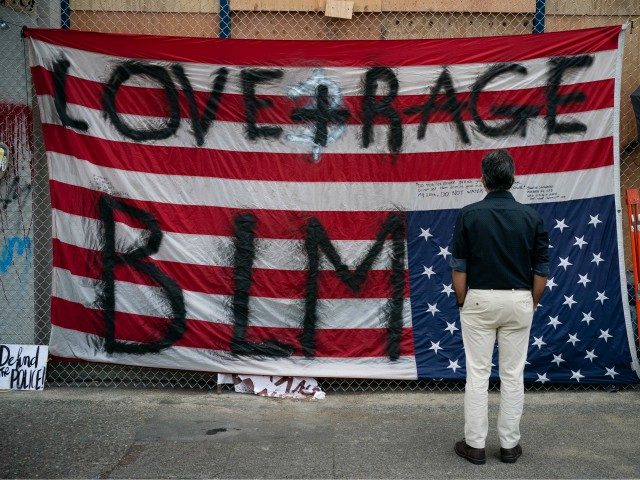Black Americans who are “tired” of American hostility can relocate to Ghana and be “free from White America’s psychic violence,” according to a recent Washington Post piece that suggests, “Sometimes, leaving is the most powerful form of resistance.”
In an essay published in the Washington Post on Wednesday titled, “For African Americans tired of U.S. hostility, Ghana is still calling,” columnist Karen Attiah begins by citing American civil rights activist W.E.B. DuBois’ move to Ghana in 1961.
“He had endured Jim Crow racism, FBI surveillance and the confiscation of his passport by the United States, and decided it was enough,” she wrote.
Attiah, who has previously reported from Ghana, then quotes a poem of DuBois, titled “Ghana Calls,” which she says served as a “scathing resignation notice” that he “handed White America.”
The author then claims that last Saturday’s mass shooting in Buffalo demonstrates that America has hardly progressed in decades.
“Nearly 60 years after Du Bois’s death, America is still trying to perfume itself to the world as a haven of freedom and progress,” she wrote. “But the past weekend has been a reminder that America is all too content to tolerate the stench of Black death.”
Visiting Du Bois’ former home-turned-museum in Ghana days after the attack, Attiah says it was there she “pondered what Black asylum from white supremacy truly looks like.”
Though “much liberal commentary has been devoted to blaming Fox News, Tucker Carlson and other race-baiting GOP apparatchiks for promoting racism and the great replacement theory,” she writes, “when it comes to white supremacy, White liberals have long held on to dangerously naive replacement theories of their own — that increasing populations of nonwhites will automatically dent anti-Blackness, for instance, and that younger generations are automatically less racist than their forebears.”
Arguing that “liberal complacency puts us all at risk,” Attiah states that with “these domestic options, it’s no wonder that in the past several years, there are more stories of Black people yearning for elsewhere,” noting recent social media communities that are a “testament to a growing awareness that Black people don’t have to feel trapped in America.”
She then quotes a Ghanaian American friend who moved back to Ghana, as saying, “I don’t have to freeze and worry for my life every time I see a police officer” there.
Slamming the “American exceptionalist idea that the country is so great that Black people should be willing to endure its ills,” Attiah dismissed the “stay and fight” approach promoted by elected leaders “who do little with their power to protect Black people when we vote for them.”
“Josephine Baker, James Baldwin, Richard Wright, Maya Angelou and Nina Simone all left America for Europe and Africa to feel mentally and spiritually free from White America’s psychic violence,” she wrote.
“Sometimes, leaving is the most powerful form of resistance,” she added.
While “open racism becomes more mainstream in major Western countries,” the author states it’s “complicated” to know whether “Blaxit” will become a bigger movement.
“The feeling of having to leave home for a better life comes with grief, guilt and moving costs,” she wrote.
“Cultural differences, and ignorance on both sides about African and African American history and culture, are not easy to overcome,” she admits.
Attiah concludes that “the truth remains that Black people in the diaspora no longer have to be chained to countries that jail them, kill them and subject them to horrific hate crimes.”
“To borrow from Maya Angelou, God gave us traveling shoes, and if Black people choose to use them, so be it,” she added.
Roughly three-quarters of Ghana residents want to immigrate to the U.S. or Europe, according to a 2018 study by Pew Research Center.
According to the State Department’s recent Country Reports on Human Rights Practices, significant human rights issues plague the West African country, including “serious restrictions” on free expression and freedom of assembly; “serious” government corruption; “lack of investigation of and accountability” for gender-based violence; crimes against LGBTQ persons and those with disabilities; and some of “the worst forms of child labor.”
Ghana is one of 69 nations with active anti-sodomy laws and stipulates a prison term of three years for engaging in homosexual sex.
Last year, proposed legislation in the country reiterated a ban on same-sex marriage while prohibiting LGBT indoctrination.
The country continues to struggle with economic troubles which were worsened by the recent coronavirus pandemic.
In August, thousands of protesters marched in Ghana’s capital Accra under the slogan “#FixTheCountry” against corruption, poverty, and the education system.
The Post essay comes as many on the left continue to depict America as a systemically racist country.
On Tuesday, CNN senior political reporter Malika Henderson said that “white Americans have to come to terms with” their racism while reacting to President Joe Biden’s speech in Buffalo, NY, after the mass shooting in Tops supermarket.
Last month, 1619 Project creator and professor Nikole Hannah-Jones said she did not know how anyone could argue that the U.S. was not “founded as a racist country.”
In March, a Washington Post piece accused many Americans of denying and downplaying rampant racism throughout the country, claiming the killers of Ahmaud Arbery “stand in for millions of Americans” nationwide who believe that skin color deems one “less worthy.”
Follow Joshua Klein on Twitter @JoshuaKlein.

COMMENTS
Please let us know if you're having issues with commenting.